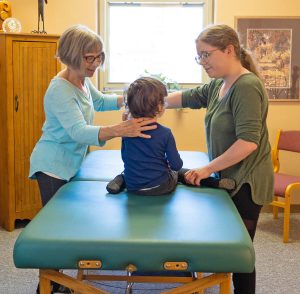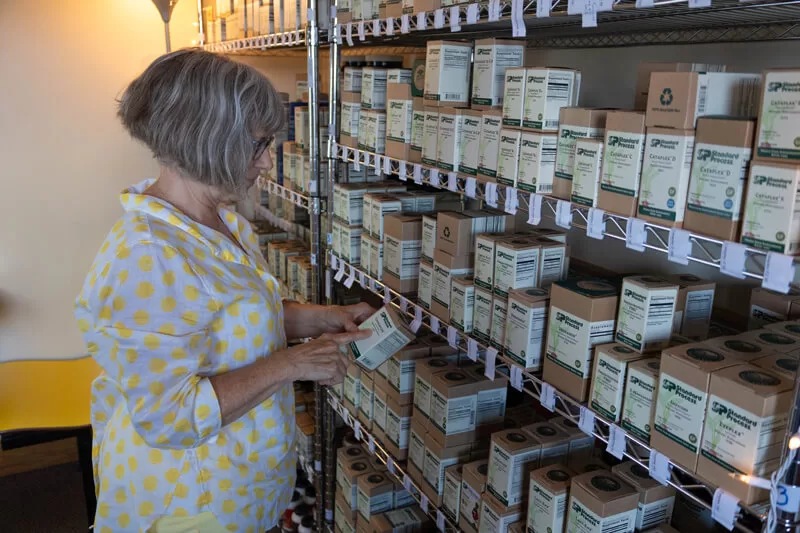- WE MOVED !!!
-
 Professional Acupuncture & Physical Therapy1118 East Superior Street
Professional Acupuncture & Physical Therapy1118 East Superior Street
Duluth, MN 55802(218) 724-3400 Clinic Hours
Mon8:00 am - 4:30 pmTue1:45 pm - 4:30 pmWed8:00 am - 4:30 pmThu8:00 am - 4:30 pmFriCLOSED

- Long Covid Booklet
Acupuncture
Acunpuncture for Postpartum: Gentle Support For Every Stage

Rebuilding, Restoring & Reconnecting
Once the baby is here, the body begins a deep recovery process. In Traditional Chinese Medicine, the postpartum period is called “the Golden Month”—a sacred window of time to nourish the mother and rebuild energy.
Acupuncture during this phase helps support:
- Hormone regulation and emotional balance
- Breastfeeding and milk supply
- Sleep and energy restoration
- Uterine healing and recovery
- Postpartum anxiety or depression
- Pain from delivery, C-section, or body strain
Even one or two postpartum sessions can help you feel more like yourself again. Acupuncture Is More Than Just a Needle—It’s a Companion for the Journey
From early pregnancy nausea to postpartum healing, acupuncture meets you right where you are—with personalized, holistic care that supports you as a whole person, not just a symptom or stage.
Curious how acupuncture might support your pregnancy or postpartum recovery? Let’s chat. Call us at (218) 724-3400 and Heidi will walk you through what’s possible.
Acupuncture for Pregnancy & Labor: Gentle Support Through Every Stage
 Whether you’re expecting your first baby or your fourth – pregnancy is a powerful journey—and let’s be honest, it’s not always the easiest ride. From swollen ankles and back pain to labor jitters and postpartum recovery, your body goes through a lot.
Whether you’re expecting your first baby or your fourth – pregnancy is a powerful journey—and let’s be honest, it’s not always the easiest ride. From swollen ankles and back pain to labor jitters and postpartum recovery, your body goes through a lot.
Thankfully, acupuncture offers natural, gentle support through each phase of this incredible transition. And no—it’s not just about pain relief. It’s about balancing your entire system so you can feel more grounded, more connected, and more prepared for what’s next.
Before Birth:
Supporting Pregnancy, Labor Prep & Breech Babies – Acupuncture during pregnancy focuses on helping your body adapt to the changes it’s going through. It’s safe, effective, and can be tailored to your trimester.
Common areas of support include:
- Nausea & morning sickness
- Back, hip, or pelvic pain
- Digestive issues or heartburn
- Fatigue or poor sleep
- Anxiety, stress, and emotional overwhelm
As you approach your due date, we shift into what’s often called labor preparation acupuncture. Around 36–37 weeks, many acupuncturists recommend weekly treatments to help:
- Encourage optimal baby positioning
- Relax and soften the cervix
- Regulate hormones and reduce anxiety
- Support restful sleep before labor
- Gently encourage the body to move toward labor naturally
And if your baby is breech (feet or bottom down instead of head-down)? Acupuncture, combined with a gentle heat therapy technique called moxibustion, is often used between weeks 33–36 to encourage babies to turn.
Moxa is a warming herb that’s burned near specific acupuncture points—especially on the pinky toes!—to stimulate movement and energy in the uterus. Several studies have shown this technique can significantly improve the chances of a baby turning on their own—non-invasively and safely.
During Labor:
Acupressure & Calm in the Chaos – While acupuncture isn’t typically done during active labor (unless you’ve got a doula or midwife trained in it), acupressure can be a game-changer.
Your acupuncturist can teach you and your partner simple pressure points to use during labor that may:
- Help with pain management
- Encourage contractions
- Calm the nervous system
- Boost energy during long labor
- Support dilation and downward movement
These techniques are simple, safe, and give you an empowering tool during the birth process.
Curious how acupuncture might support your pregnancy or postpartum recovery? Let’s chat. Call us at (218) 724-3400 and we’ll walk you through what’s possible.
Acupuncture for Kids

Most kids, as well as a lot of adults, are afraid of needles. So the pairing of acupuncture and kids might not be an obvious one. However, more and more parents are seeking alternative methods of treatment for their children, because our conventional medical system is faltering a bit. Pharmaceuticals are proving to be more harmful than beneficial for many people, especially kids, whose brains and bodies aren’t yet fully developed.
Acupuncture is gaining popularity among pediatrics. There are licensed acupuncturists who specialize in treating children and they are in high demand. These pediatric acupuncturists are helping children where others can’t and for many, it is lifesaving.
 Pediatric acupuncture is commonly known as shonishin and it rarely uses needles. Instead, this form of acupuncture utilizes the practitioners’ hands and rounded tools to stimulate the acupoints of the child. The practitioner will gently and rhythmically rub, tap and press the skin to produce gentle stimulation sensations. Because children process things more quickly and with fewer blockages, the sessions can be shorter and may be needed less frequently.
Pediatric acupuncture is commonly known as shonishin and it rarely uses needles. Instead, this form of acupuncture utilizes the practitioners’ hands and rounded tools to stimulate the acupoints of the child. The practitioner will gently and rhythmically rub, tap and press the skin to produce gentle stimulation sensations. Because children process things more quickly and with fewer blockages, the sessions can be shorter and may be needed less frequently.
Parents are turning to acupuncture because it provides a safe resolution of illness, while also preventing future illnesses. Acupuncture and acupressure stimulate the body’s ability to restore and heal itself. Our bodies are fully capable of fighting off disease and healing injuries when the right tools are provided. Acupuncture is that right tool that not only stimulates the immune system, but also relaxes the nervous system and regulates the digestive and hormonal systems. All of these things need to be in balance for the body to heal.
Many times parents are told by doctors that what their child is experiencing is just “a phase” and he / she “will grow out of it.” In many ways, this is a way of ignoring the real issues at hand. Conventional medicine doesn’t work holistically, addressing the whole body, and parents are usually sent to a dozen different specialists who never really coordinate to find the best treatment for the child. This becomes frustrating and financially taxing for the parent, not to mention how the child feels. This is where acupuncture excels. A single acupuncture treatment can address pain, anxiety, insomnia and digestive issues all at the same time.
Not only is acupuncture more cost effective when it comes to treating children, but it also is a more logical approach. Why add in the stress of seeing multiple doctors when you can have everything addressed by just one? If your child is suffering from pain, asthma, ADHD or any other type of ailment, acupuncture might hold the answer. Ask Heidi today for more information. Call (218) 724-3400 today to schedule an appointment.
The Shen Mind Connection

Traditional Chinese Medicine looks at things differently and while it may be a little confusing, there is usually some common ground that can be found upon examination and explanation. One such area is the idea of the mind. The mind in Traditional Chinese Medicine is commonly referred to as the shen.
In Chinese medicine, the shen is interpreted as the spirit or consciousness. The shen lives in the heart organ system and it is considered to be one of the vital substances of the body. The shen is said to preside over the activities that take place in the spiritual and mental planes. So, for many TCM practitioners, shen is actually referring to the mind. And if we look at serious mental illnesses such as schizophrenia and bipolar disorders, the shen or mind is where the dysfunction actually appears.
Chinese medicine refers to this as being “misted” or “clouded”. However, it should be noted not all practitioners agree the mind and the consciousness are the same thing. This is because many of our mental processes are considered subconscious.
As stated, the theory is that the shen lives in the heart. So if a person has a disturbed shen, there may be anxiety, stress, difficulty breathing, heart palpitations and more. Many people with a disturbed shen experience insomnia. Chronic insomnia can then lead to actual mental illness. If we follow this logic, we can see how the shen (in Chinese medicine) and the mind (in Western psychology) are related and somewhat interchangeable.
 When we approach the shen from the standpoint of Western psychology, it is hard to deny there is a lot of shen disturbance in the modern world. This can be anything from anxiety, depression and addiction to the aforementioned serious mental illnesses like schizophrenia. A person with balanced shen will present as healthy, harmonious and level-headed. A person with disturbed shen will present with a lack of spirit or emotion, illogical reasoning and symptoms of mental illness.
When we approach the shen from the standpoint of Western psychology, it is hard to deny there is a lot of shen disturbance in the modern world. This can be anything from anxiety, depression and addiction to the aforementioned serious mental illnesses like schizophrenia. A person with balanced shen will present as healthy, harmonious and level-headed. A person with disturbed shen will present with a lack of spirit or emotion, illogical reasoning and symptoms of mental illness.
Ultimately, we want to have a balanced shen. This means we may have emotional responses to external stimuli or internally generated thoughts or feelings and we are capable of controlling and recovering from these situations without much incident. Somebody who has a disturbed shen, would not know how or be able to deal with a similar situation and may act out irrationally
while drawing attention to themselves. An example would be when a person with a balanced shen becomes angry or cries for some reason. They tend to feel relief after the emotion has passed. While somebody with a disturbed shen may continue the irrational behavior for quite some time without ever feeling that relief and they might need intervention to return to a somewhat balanced state.
Maintaining a healthy shen also means that we maintain a healthy body. A strong shen is fundamental to good health. When the shen is weak, the body will eventually fail. To keep the shen healthy we should focus on maintaining a positive mindset, getting enough rest, seeking peace, connecting with nature, meditating and showing compassion. This means we ultimately need to avoid overwork, chronic stress, an erratic daily schedule, lack of sleep and volatile emotions such as anger, hatred and resentment. This may seem pretty logical, but based on the amount of shen disturbance/mental illness in the world, it is clear we have lost our way to some degree.
The good news is the cumulative shen of the planet can be changed over time and we can all have a hand in making that change.
Long Haul Covid: TCM vs Western Perspectives

It’s bad enough having Covid, but dealing with lingering symptoms after fighting the infection is downright unfair. Why can’t some people (actually as many as almost half of those infected ) make a clean recovery from Covid? “Long-Haul Covid” (LHC) describes a condition of covid-related symptoms that can last for months after infection, and for some, even longer. This phenomenon is currently being studied so we can better understand the how and why.
The list of possible lingering symptoms is long and conveys the reach of this virus
and its effects on nearly every system of the body: Fatigue, fever, headaches, dizziness, cough, chest pain, heart palpitations, numbness, brain fog, changes in taste and smell, sleep problems, digestive issues, joint pain, rashes, menstrual cycle disturbances, anxiety, and depression. And the list goes on. For some it may only be one stubborn disturbance, for others, it may be a debilitating combination of symptoms.
Lingering symptoms can be from direct harm done to the body by the virus. Covid can take a toll on the body from the level of organs to organelles (microscopic cellular structures) and everything in between. Damage to the body’s organs and tissues may cause various systemic long COVID symptoms. Mitochondrial damage is another focal point of research as this organelle is responsible for energy production in the body and is a target for viral damage. This is an important area of study as ‘covid fatigue’ is one of the most common long-haul symptoms.
 The immune system itself can also cause harm when unregulated. Cytokine storms are an over-aggressive immune response that can lead to persisting inflammation in the body. Many people with long-haul COVID have elevated cytokine levels, suggesting hyper-inflammation plays a role in LHC.
The immune system itself can also cause harm when unregulated. Cytokine storms are an over-aggressive immune response that can lead to persisting inflammation in the body. Many people with long-haul COVID have elevated cytokine levels, suggesting hyper-inflammation plays a role in LHC.
Another possible immune response scenario is that the stress of COVID confuses the body, triggering an autoimmune response, where the immune system mistakenly attacks its own healthy cells, tissues, and organs. There are also theories that the immune system is not actually confused, but going after viral remnants that have gone deeper into hiding and our own tissues become collateral damage in this war. Another related theory proposes that COVID-19 infection could reactivate, or wake up, other viruses in the body that have gone dormant, resulting in various immune reactions.
LHC from a Chinese Medicine perspective takes into account that COVID is generally considered to be a ‘damp’ pathogen, affecting fluid balance in the body. This imbalance causes inflammation and the main symptoms of cough and fatigue. As the body works to restore balance by redistributing fluid and energy, as well as expelling the pathogen, some may need extra help depending on their constitution, environment, lifestyle and the strength/amount of the pathogen. If help is not received and the imbalance persists, it can manifest in 4 main ways.
Deficiency. The infection drained the body of qi (energy), blood, or body fluids. The key symptom of deficiency is fatigue.
Excess. Covid’s signature effect of ‘dampness’, in excess, can lead to feelings of heaviness and stiffness, as well as symptoms like diarrhea and bloating. Excess heat from the virus in the body can also manifest in things like chronic fever or red itchy rashes.
Stagnation. This is any scenario where the virus has blocked the free flow of the blood and energy in the body. In this form the prominent symptom is pain. The more severe the blockage, the more severe the pain.
Retained Pathogen/Latent Heat: Similar to the idea that viral remnants remain in the body to either confuse or overstimulate the immune system, ths Chinese Medicine concept of ‘retained pathogens’ refers to when a pathogen gets ‘stuck’ in the body, because the body is too weak to fully drive it out. It can stay at an intermediate level in the body causing flu-like symptoms (ie: body aches and fatigue), or go deeper to ‘hide out’ as “Latent Heat” to come
If you are dealing with Long-Haul Covid, it’s been long enough! A TCM practitioner can address the specific patterns and factors that have prevented full recovery and help bring you back into a state of balance and health. Call Heidi at (218) 724-3400 to get seen in Duluth!
